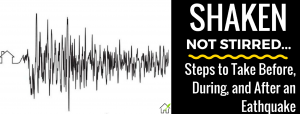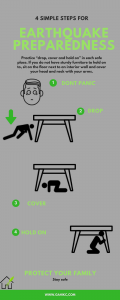 It is important for families, schools and businesses to offer earthquake education and preparedness planning. You may not think you’re at risk, but earthquakes can strike at any time. Which means preparing and planning is essential for earthquake safety!
It is important for families, schools and businesses to offer earthquake education and preparedness planning. You may not think you’re at risk, but earthquakes can strike at any time. Which means preparing and planning is essential for earthquake safety!
So how do you plan for a potential earthquake? By following these preparedness tips, you can make sure your family will stay out of harm’s way and survive.
What to do before an earthquake:
- Identify safe spots and danger zones in each room. Danger zones would include windows, or rooms with heavy furniture.
- Buy a large garbage can to store bottled drinking water, canned and dried non-perishable food, a can opener, flashlights, first aid supplies, battery powered radio, seasonal clothing and blankets. It may also become your “go kit” if you need to leave your home.
- Store bottled foods, glass, china and other breakable items on low shelves or in cabinets that can fasten shut. Place large or heavy objects on lower shelves.
- Brace bookshelves and heavy furniture to walls to keep them from toppling.
- Make sure you securely fasten water heaters and gas appliances to wall studs.
- Buy earthquake insurance.
What to do during an earthquake:
What to do during an earthquake
- If indoors – take cover under sturdy furniture or against an inside wall. “Drop, Cover and Hold On” until the shaking stops. This means DROP down to the floor, take COVER and protect your head and neck with your arms, and HOLD ON to the sturdy piece of furniture you are under until the shaking stops.
- If outdoors – stay there. Move away from buildings, streetlights and utility wires.
- In a high-rise building – take cover under sturdy furniture away from windows and outside walls. Stay in the building on the same floor. An evacuation may not be necessary. Do not use elevators
What to do immediately after an earthquake:
- Check for injuries.
- Be prepared for aftershocks.
- Keep an eye out for fallen debris and broken glass.
- If the electricity is out – use flashlights. Check the main utility panel.
- If you smell gas or hear a hissing sound – open a window and leave the building. Shut off the main gas valve outside the building.
- If water pipes are damaged – shut off the water supply at the main valve.
- Check your home and chimney for structural damage
- Check household appliances for damage.

Join millions of families October 20th as they get ready to #ShakeOut. An event where families just like yours practice earthquake preparedness and safety
Unlike hurricanes and other natural hazards, earthquakes strike suddenly and without warning. Nevertheless, there are things that you can do to reduce the chances that you or other members of your household will be injured, that your property will be damaged, or that your home life will be unduly disrupted by an earthquake.



















Leave A Comment